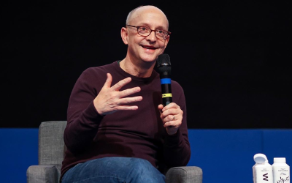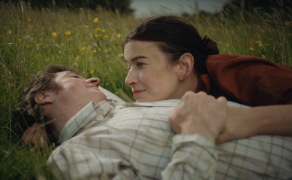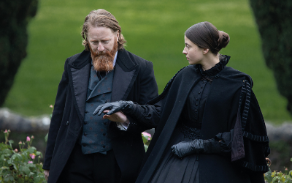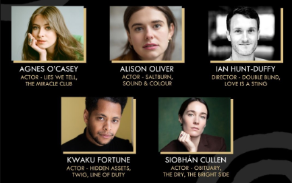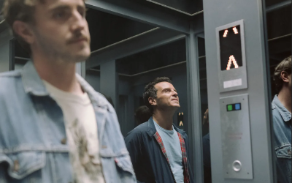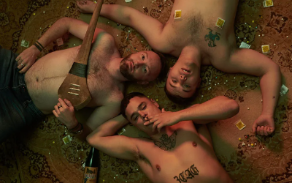We spoke with producer Ed Guiney about Element Pictures’ new screenwriting festival, Storyhouse. The two-day festival took place in the Light House Cinema, featuring speakers such as Tony McNamara (Poor Things), Nancy Harris (The Dry), and Molly Manning Walker (How To Have Sex).
In 2001, Ed Guiney co-founded Element Pictures with Andrew Lowe. The company has gone on to produce critically-acclaimed films and television series including Normal People, Room, The Favourite, The Dry, and most recently Poor Things, which received four Oscars at the 96th Academy Awards this year. Shortly before their most recent Oscar success, Element announced a new not-for-profit initiative aimed at screenwriters, spearheaded by co-CEO Guiney.
Storyhouse is a new festival which celebrates the art of storytelling for the screen. The festival’s inaugural edition was held in Dublin’s Light House Cinema. Aspiring screenwriters were invited to apply for Storyhouse Lab, an inclusive professional development programme that ran as part of the festival.
Day one of Storyhouse kicked off with an introduction from Charlene Lydon and Lara Hickey, followed by Guiney giving an overview of the new screenwriting festival.
The first two Storyhouse talks were centred around writing for television, firstly with a panel moderated by journalist and author Patrick Freyne. Emma Moran (Extraordinary), Namsi Khan (True Detective: Night Country) and Baz Ashmawy (Faithless) spoke about their varied screenwriting origins, and shared what they've learned along the way. Next was a case study of The Dry, with screenwriter Nancy Harris and producer Emma Norton discussing the development of the series, and the creative challenges they overcame while doing so. This included showing the audience excerpts of the show, and comparing them to how those scenes looked on the page.
An interview with Oscar-nominated Poor Things and The Favourite screenwriter Tony McNamara concluded the festival’s first day. McNamara gave a candid interview about his own experiences writing professionally, and the many obstacles one faces in the industry, ultimately leaving the audience with an empowering message: "It's easy to go 'It's a tough business', and blame the business, but you've gotta start with yourself and you've gotta start with getting your craft in order."
The following morning, the festival continued with a panel on the topic of writer-directors, moderated by director Frank Berry. This panel’s speakers were Ali Abbasi (Holy Spider), Mounia Akl (Boiling Point), and Stacey Gregg (Ballywalter). Writer, academic and disability activist Sinéad Burke then moderated a talk with Sarah Phelps (Dublin Murders, The Sixth Commandment), who spoke candidly about her twenty year career writing television, exploring the nuances of writing for soap operas as well as true crime drama.
After lunch, Molly Manning Walker (How To Have Sex) and Charlotte Regan (Scrapper) discussed their respective debut features and their ongoing creative collaborations with one another, as well as how they maintained their unique voices while crafting their first features.
The last talk of the festival was moderated by director Lenny Abrahamson, who interviewed David Nicholls (One Day) about writing both television series and novels, and how those two mediums have influenced Nicholls’ approach as a writer.
We sat down with Element Pictures co-CEO Ed Guiney to discuss the origins of Storyhouse, what he looks for in creative partnerships, and the future of this festival.
IFTN: First of all, congrats on the Oscars. What's it like going straight from that experience to organising a brand new screenwriting festival?
ED: “Probably wasn't the best timing in the world in one way, but actually in another way it was! Tony [McNamara] was the first person I asked to do it because I was seeing a lot of him. He signed up and that was a great start! I’d met people like Molly Manning Walker on the circuit, so you kind of make connections as you go along.”
IFTN: You mentioned yesterday this is something you've been thinking about for a long time. When did you start thinking about this, and what was the motivation behind establishing the festival?
ED: “Charlene Lydon was saying that she found an email from 2016, when we were talking about it. I've been thinking about it for literally years. It seems very obvious to me that you would have a festival based around screenwriting. Obviously, a lot of film festivals are more director-actor centric, and there are festivals like Camerimage for DPs and festivals for screenwriting, but there just aren't that many of them.”
“Storyhouse is about having a direct conversation between writers and people who want to write, and something I'm really glad about is that people have been very candid and honest. A lot of events, the promotional ones, everyone's like ‘Oh, we got on so well, it was amazing’, but here people are being much more nuanced about their experiences, which I think is really helpful. It just makes it more relatable because it’s hard to write great stuff. I think it’s good to hear other writers say ‘Keep going, keep at it’.”
IFTN: The Lab participants are three days into the workshop. Could you tell us a little bit about the Lab?
ED: “It was always an idea that we'd run something alongside this where you can attend the events that are open to the public, but then also have a more intimate, honest encounter with the screenwriters. There's certain things that you can say in that environment, that you can't really say in a big room.”
“So we always said we’d do a Lab, and then it was Lara Hickey, Charlene Lydon, and Screen Ireland who really ran with us. I think we read 350 applications for 15 places. The participants are very accomplished, a lot of them have made stuff, theatre and comedy for example. They’re already quite experienced. I think that’s good because having been through it a bit, you're not completely aspirational, and there are real questions you've encountered in how you work.”
“It's pretty full on for them because on either side of our public schedule, they’ve met with Tony and now Sarah [Phelps], and they'll meet with David [Nicholls] later today.”
IFTN: I think you really hit the nail on the head yesterday when you brought up the literary tradition of Ireland in regards to this initiative.
ED: “Yeah, totally. I really feel that for the industry to grow here, we need more storytellers. We need more screenwriters. Like Tony said, there's a huge demand for great scripts in the world, and it's very hard to write a great script. But I think, arguably, we have a head start at some level. That tradition exists here, it’s already very fertile soil.”
IFTN: Another point that was brought up yesterday is that Element is driven by relationships and not commercial success. What are some of the qualities you seek in your creative collaborators?
ED: “I guess people who have something unique to say. Finding standout people, standout artists, and also, crucially, things that me and my colleagues respond to. Also, Tony said this and I think it's really true, it's also about finding people that you like and would like to work with. Because if you make multiple films with somebody, you really need to want to spend time with them. That is a really important part of it for us.”
“It’s a very noisy world, and it’s hard for things to stand out. There's a lot of stuff in the middle that doesn't pop one way or another. What actually does pop is a boldness of storytelling, and I guess that's what we look for. There’s quite a lot of stuff that's just in a soupy middle, perfectly okay but not amazing, and we're always looking for the thing that can raise its head above the soup of whatever the culture is.”
IFTN: Finally, what do you hope people take away from Storyhouse, and what do you hope for Storyhouse itself going forward?
ED: “I hope that people are inspired by it, that there'll be certain guests that speak to them in a particular way.”
“That panel with Mounia, Ali, and Stacey, you could see they all have very different processes, which is fascinating. There's no one way to do it, and I suppose there’s a common theme there that to do really great work, you have to dig deep. I think it’s important people know that, because a lot of the time I see stuff that's quite complacent, that feels like other things, that’s quite derivative and you’re going ‘Why should I make this thing?’. I don't think there's anyone that we've heard today that's doing something complacent or derivative.”
“As for Storyhouse itself, I think we'll definitely do it again. I think we'll grow it, and we might make it a little longer, we might mix it up and have screenings. We’ll keep the same energy of people being candid about their process and experience, because that's what's valuable.”


